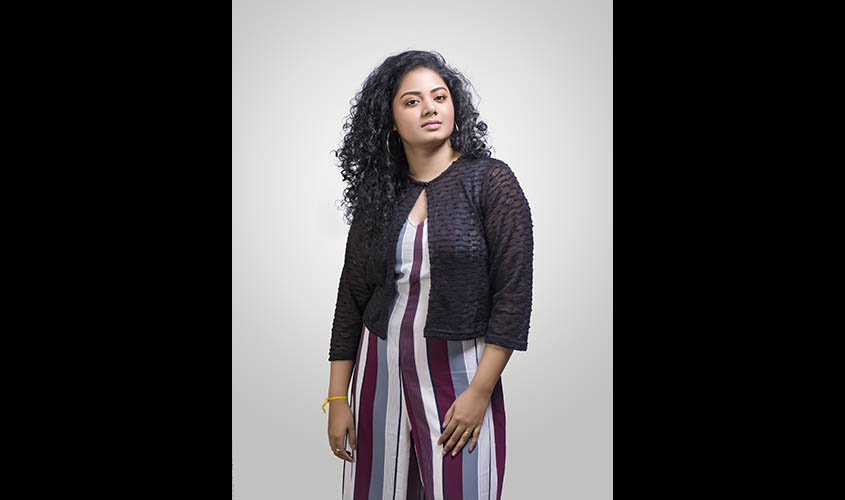Playback singer and composer Anwesshaa speaks to Mayank Jain about her long association with the Hindi film music industry and her decision to go independent with her new album Mizaaj-e-ishq.
Having lent her voice to hit songs like “Banarasiya” (from the movie Ranjhanaa ) and “Jalte Diye” (Prem Ratan Dhan Payo), Anwesshaa has established herself as a playback singer and composer in Bollywood and has won numerous awards for her work. She is now set to take her career to the next stage, with a solo album entitled Mizaaj-e-Ishq, which features a series of tuneful, romantic songs she has sung in Hindi, English and Bengali. In this interview, she spoke to Guardian 20 about the new album, her playback career and her early encounter with reality TV.
Q. Tell us about your latest album Mizaaj-e-Ishq. What does it offer?
A. Mizaaj-e-ishq is an album of love songs. There are different stages in love and each one comes with its own characteristics. This single emotion can be experienced differently in various phases of a lifetime, leaving a profound impact on a being. Mizaaj-e-ishq (moods of love) can take listeners on a calming journey that will make them pause for a moment and listen to their heartbeat in an era that is defined by race and pace.
Q. How would you define your musical sensibility?
A. I have always had an ear for sounds that soothe. I am open to listening to genres which I have not been exposed to. My musician colleagues have also widened the spectrum of my playlist to some extent, and I don’t find myself very rigid as a student of music. One thing is for sure—that I can make out what is music and what is noise in the garb of music. I would choose silence over the latter.
Q. You started out your journey with a reality show as a teenager. How did you deal with showbiz and fame at that young age?
A. My parents played a vital role in this. Sudden accolades, media attention, gigs, appearances and fans changed the life around me. All this is too demanding for a 14-year-old. I could have lost touch with the ground reality, had my mother not told me that doing well in a competition is not a big deal, and that there is a long and hard way to travel before I become a complete artist. “As of now, take it easy and go to school,” she told me. Not everyone is lucky enough to be surrounded by real people who don’t let you get carried away with success.
Q. Most singers who do well in reality shows struggle to make a name for themselves in the music industry. What really worked for you?
A. There were fewer shows when I started out. Popular contestants created a lot of stir among people and in the industry, which is probably why films like I AM 24and Golmaal Returns happened soon after the show for me.
I feel that there can never be a surplus of brilliance. Noticeable talents come once in a blue moon. Sadly these days, the idea [of reality shows] matters more than the discovery of new talent. It’s business now. Hence, a clutter of such shows. It is very tough for good singers to get noticed.
Q. You sing mostly love songs. What is it about this theme that interests you?
A. Art is a reflection of life and love is the basis of all life forms. It is the reason we exist. For centuries, poets have been writing on it and it seems like an ageless topic as the audience is never tired of reading, listening and watching romance.
The longevity of my content shall depend on what new I can bring to your playlist. One of my fans recently wrote to me saying that he listens to my album before going to sleep. As a singer-composer, I want to try everything, but I would be glad if my music can bring people into a restful state. That is the need of the hour.
Q. Like you, many singers today are pursuing solo careers independent of the film industry. Do you get more artistic freedom when you make music independently, as opposed to when you are working on film music?
A. Yes, because I am neither confined by a situation, story, character, nor by other people’s preferences.
Q. How have you kept yourself away from item songs and other generic inventions of film music?
A. I have been called by composers mostly for romantic numbers. But it is good fun to explore and hear myself in genres that are poles apart. As I compose and write music now, I thankfully don’t have to wait for others to call me if I want to try something I haven’t. I don’t really look down upon item numbers at all. Making them is an art. “Sheila Ki Jawani” and “Chikni Chameli” are examples of how grand item songs can be.
Q. What are your upcoming projects?
A. As of now, I’m gearing up for my debut feature film,Limelight, as a composer-songwriter. Another Bangla film, Bidrohini, which I composed and wrote for, is lined up for December. Also in Bangla, I have Rajesh Roshan’s “Roktomukhi Neela, Aaro ek chhaddobeshi”, which will be my first duet with Anupam [Roy] Da; Bohoman for Pt. Tanmay Bose, Slilotahanir pore. In Hindi, there is Anurag Kashyap’s Baansuri, where I have sung for Rik and Aditya Pushkarna, The final encounter, Me too, etc. Among other regional languages, I have Samayadha gombe (Kannada), Chaupadi/Padyam,Hyderabad custody

